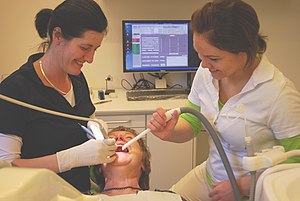
- Image via Wikipedia
A recent scientific study confirms that dental sealants used on millions of school children are releasing the potentially dangerous chemical bisphenol A (BPA), the resin used in many kinds of plastics, including some water bottles and metal food can liners.
A growing library of evidence strongly suggests that BPA has harmful health effects, including heart disease and certain cancers, and abnormal brain development in children.
The study, published in the journal Pediatrics, cautions that dental sealants, which are brushed onto teeth to smooth them out and reduce decay, as well as some plastic-based white fillings, do contain precursors for BPA which become BPA after coming in contact with saliva.
BPA-related compounds — such as bis-DMA — leech into the saliva, where they are converted to pure BPA, and can be found up to three hours after the filling was placed, according to the authors.
Although the amount of BPA absorbed and the duration of systemic BPA absorption was not clear from the available data, the study did show that scrubbing and rinsing sealants and fillings immediately after they are applied removes 88 to 95 percent of the compounds that can become BPA, reducing whatever risk there might be.
Nevertheless, Dr. Abby Fleisch of Children‘s Hospital Boston, who led the research, advises caution: “We would recommend avoiding sealants during pregnancy.”
BPA is classified as an endocrine disruptor because of its estrogen-like effects on the body. Such chemicals may cause health problems, but most of the direct evidence regarding BPA comes from animal studies, not human studies.
The study authors were unable to recommend BPA-free brands of dental sealants and composites. Manufacturers are not required to disclose the ingredients in their products, making such choices impossible for dentists and patients.
Manufacturers continue to use compounds that have not been studied for human safety, such as triethylene glycol dimethacrylate (TEGDMA) and urethane dimethacrylate (UDMA), which may or may not pose other risks. The FDA and other government agencies responsible for our health and safety continue to ignore the situation.
In fact, there are tens of thousands of chemicals commonly used in products of every kind and description that have never been tested.
In light of the uncertainties and lack of scientific studies, thoughtful people, particularly parents, might best rely on good old-fashioned frequent brushing to maintain oral health.
SOURCE: Pediatrics, Sept. 2010, http://pediatrics.aappublications.org/cgi/content/abstract/126/4/760.

